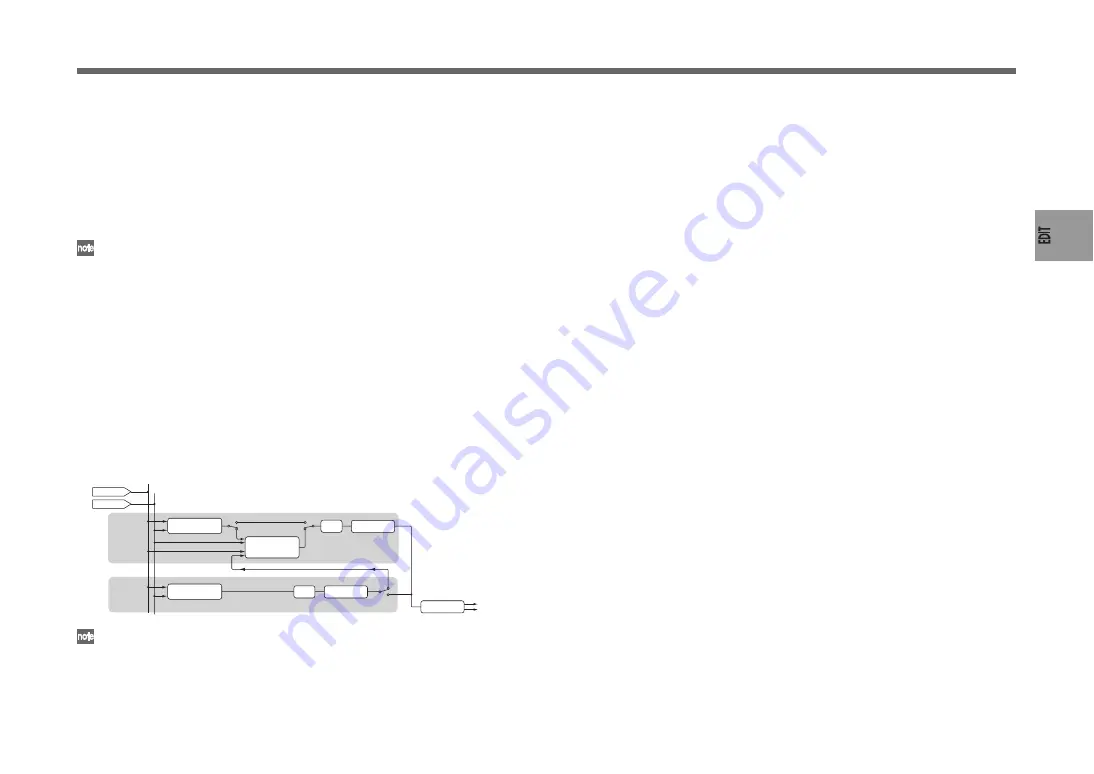
21
○ ○ ○ ○ ○ ○ ○ ○ ○ ○ ○ ○ ○ ○ ○ ○ ○ ○ ○ ○ ○ ○ ○ ○ ○ ○ ○ ○ ○ ○ ○ ○ ○ ○ ○ ○ ○ ○
Editing a vocoder program
Carrier
The carrier signal will be processed based on the modulator’s harmonic
content, so a good choice for the carrier would be a waveform that is rich
in overtones, such as a sawtooth wave or a square wave with a fixed
pulse width. You can edit these parameters in the 34. Carrier page.
To input a sawtooth wave as the carrier, edit Timbre 1 to set the 5.
OSC1 page “Wave” parameter to Saw; then use the Vocoder editing
34. Carrier page “Tmbr1Lvl” parameter to set the output level of
Timbre 1.
Modulator
You will typically use your voice as the modulator input. However,
interesting effects can also be obtained by inputting a rhythm sound On
the
R3
, you can choose whether the modulator will be an external input
such as a mic or rhythm sound (AUDIO INPUT 1), Timbre 2, or formant
motion data. If you choose Timbre 2, the Timbre 2 insert effect output
will be input to the modulator of the vocoder (
☞
Figure v - 1 ). You can
edit these parameters in the 35. Modulator-A–36. Modulator-B pages.
Figure v-1
Timbre 1
Timbre 2
Synth
Audio In 1
Synth
Vocoder
EQ
EQ
INSERT FX1/2
INSERT FX1/2
MASTER FX
Audio In 2
Carrier
Modulator
OUTPUT
(L/MONO, R)
Vocoder Sw= ON & Modulator AudioSrc = Timbre2
Vocoder Sw= ON
To input your voice as the modulator, turn the front panel
FORMANT MOTION [ON/OFF] button off, and set the 35. Modula-
tor-A page “AudioSrc“ parameter to Input1.
Basic editing
Vocoder section
The parameters for the sixteen band-pass filters (analysis filters and
synthesis filters) and the envelope followers are edited in the 37. Filter–
39. Lvl/Pan pages.
Selecting the vocoder for editing
The procedure for editing the vocoder is essentially the same as when
editing a timbre. However, you’ll first need to turn the vocoder function
on, and then select the vocoder for editing.
1
Select a vocoder program.
2
Press the [VOCODER] button.
The [VOCODER] button will blink, and the vocoder function will be
on. The vocoder is also selected for editing.
3
Use the [PAGE] dial to select the 34. Carrier –39. Lev/Pan pages, and
use knobs [1]–[4] to edit the vocoder parameters.
If you’ve selected the vocoder as the target of your editing, the [PAGE]
dial
will select only the pages containing the vocoder parameters.
4
Press the
[EXIT] button when you’re finished editing.
Summary of Contents for R3
Page 1: ...1 E ...
Page 2: ...ii ...











































